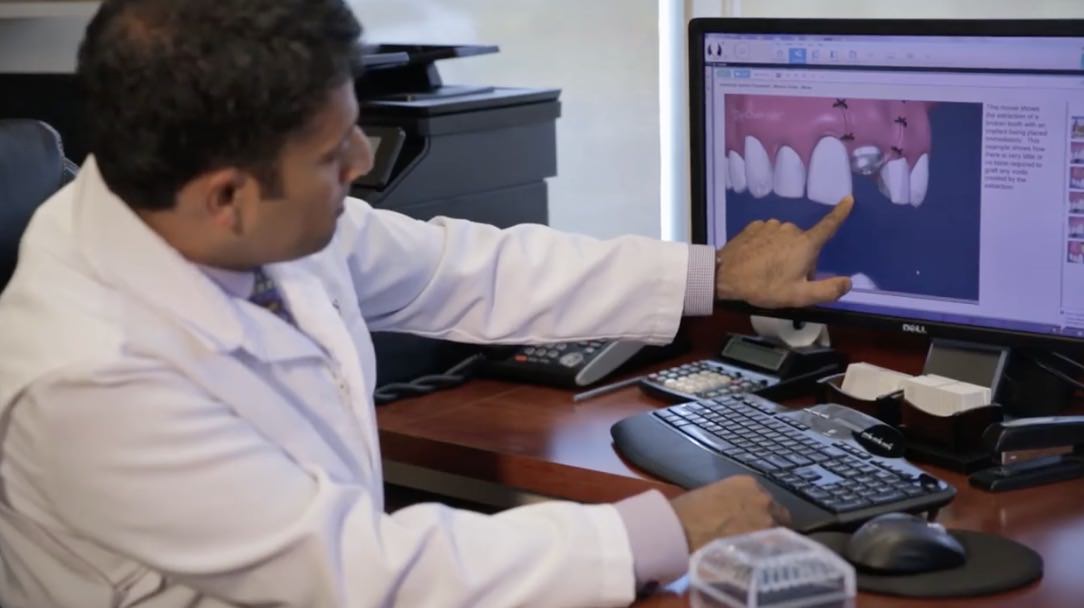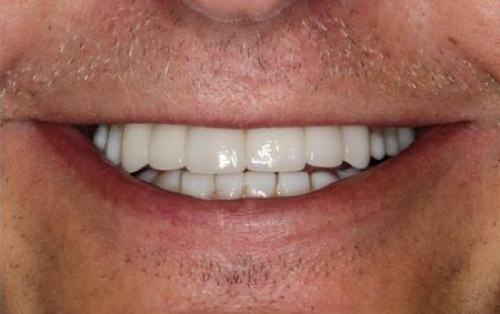Posted on Wednesday, October 4th, 2023 | 2,710 views
 For many people, sipping on a cold drink on a hot day can turn into a painful experience that’s hard to forget.
For many people, sipping on a cold drink on a hot day can turn into a painful experience that’s hard to forget.
This pain is usually due to tooth sensitivity and it’s likely that if your teeth hurt when you drink cold water, it’s because either the tooth root is exposed, you’ve lost enamel, a cavity is present or there’s a crack in your tooth.
Exposed Tooth Root and Tooth Sensitivity
To understand the cause of this severe discomfort, it’s important to first know a little bit about tooth anatomy.
Contrary to popular belief, the root of a tooth is not covered by a hard enamel like the crown (the visible part of the tooth) is, but instead, it’s covered by a softer substance called cementum.
When the cementum wears away or becomes damaged, the dentin underneath (which is full of tiny fluid-filled tubes that lead directly to the tooth’s nerve center) gets exposed.
When dentin is exposed it leads to heightened sensitivity, especially when the tooth comes into contact with cold water or food.
How to Manage Tooth Sensitivity at Home
While a visit to the dentist is the easiest way to address tooth sensitivity, there are several at-home remedies that you can try before you make an appointment for a checkup:
- Use desensitizing toothpaste: These specially-formulated toothpastes work by blocking the tubes in the teeth that are connected to the nerves and thereby reducing the severity of the pain.
- Avoid acidic foods and drinks: Acidic substances can make tooth sensitivity worse. Acid wears down the enamel and exposes the sensitive dentin. If you limit your intake of acidic food, and rinse your mouth with water after consuming them, you can reduce the level of sensitivity you’re experiencing.
- Soft-bristled toothbrush: Overly aggressive brushing and hard-bristled toothbrushes can eventually expose the roots of the tooth and further increase sensitivity. If you switch to a soft-bristled toothbrush and brush gently, this will help alleviate the level of pain you’re experiencing.
Avoid overly hard brushing
Overly hard brushing and/or using hard-bristled toothbrushes can lead a condition known as gum recession. This is where the margins of the gum tissues pull back or wear away, eventually exposing more of the tooth’s root.
Gum recession exposes the dentin and allows hot, cold, or sweet food and drinks to stimulate the nerves and cells inside the tooth, causing the pain and sensitivity.
This is why dentists have recommended for decades that we use a soft-bristled toothbrush, using gentle, circular brushing motions to clean our teeth, rather than aggressive back-and-forth movements.
Dental Solutions for Tooth Sensitivity
When at-home remedies aren’t enough to address tooth sensitivity, professional dental care becomes necessary. Here are a few possible solutions that your dentist may suggest to you:
- Fluoride Treatments: Your dentist can apply fluoride to the sensitive areas of your teeth to strengthen tooth enamel and reduce pain.
- Desensitizing or Bonding: Occasionally exposed root surfaces can be treated by applying a bonding resin to the sensitive root surfaces.
- Root Canal: If your sensitive teeth cause severe pain and other treatments are not working, your dentist might recommend a root canal treatment which is a popular procedure that’s used to treat problems in the tooth’s core.
Addressing Tooth Sensitivity with Dental Implants
 If your tooth sensitivity is due to a cracked tooth or severe decay, a dental implant procedure will likely solve sensitivity issues.
If your tooth sensitivity is due to a cracked tooth or severe decay, a dental implant procedure will likely solve sensitivity issues.
Implant replace both the lost tooth and its root, and basically eliminates the cause of the pain and allows your mouth to function properly again.
Implants provide a durable and lasting solution to tooth sensitivity and greatly improves oral health and functionality.
Read More...
About Dr. Pio Modi
After Dr. Modi graduated from McMaster University with an Honours B.Sc. in chemistry in 1997, he received his Doctorate of Dental Surgery from the University of Toronto in 2001. He began to practice dentistry in Brantford the following year. Throughout his career he's completed hundreds of hours of continuing education programs and has studied with some of the best educators in the industry.
Leave a Reply